The Freedom of the Waterway: Living (and Motoring) on a Converted Barge in France
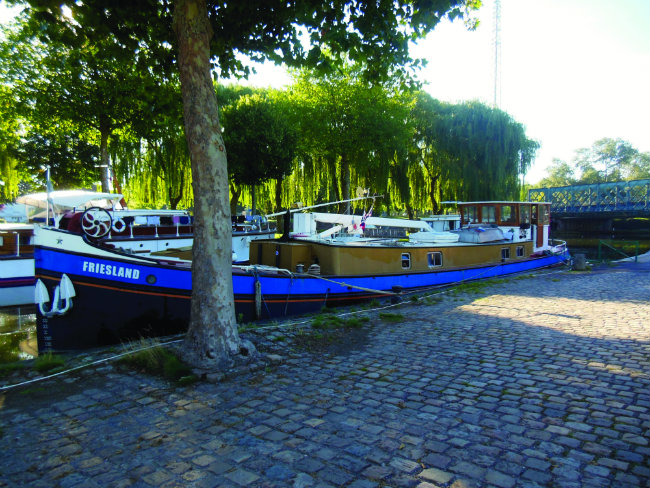
Although they are not without the odd moment of high drama, voyages in our barge ‘Friesland’ hardly equate to the swashbuckling adventures of sailors on the high seas. We just potter along quiet canals and meandering rivers, climbing hillsides lock by lock, passing through shady cuttings and dank tunnels on the high summit levels, then dropping down into the next valley through yet more locks, eventually to be disgorged into a river whose name we probably do not even know. We have spent the last 20 years cruising the waterways of mainland Europe, usually in France with occasional forays into Belgium, the Netherlands and Germany. Our motor barge ‘Friesland’ is big and comfortable and more than capable of transporting us safely along all the waterways we choose to travel.
The boating is full of contrasts: whole days spent negotiating flights of locks on a small canal in the pouring rain; misty mornings and breezy afternoons keeping track of the buoys which mark the channel on some great river. When necessary, there are early starts in winter darkness, deck still frosted from the night before and me – the crew – untying icily unyielding mooring lines in a sleepy, sullen mood; and occasionally we will find ourselves still on the move well into the evening, looking for somewhere, anywhere, to stop for the night out of the wash of the huge barges thundering by. Why do we do it? Because even when it’s awful, it’s great. And there are always those long lazy days of summer to look forward to – thoughts of which fuel this infatuation with the barging life throughout the long wintertide.
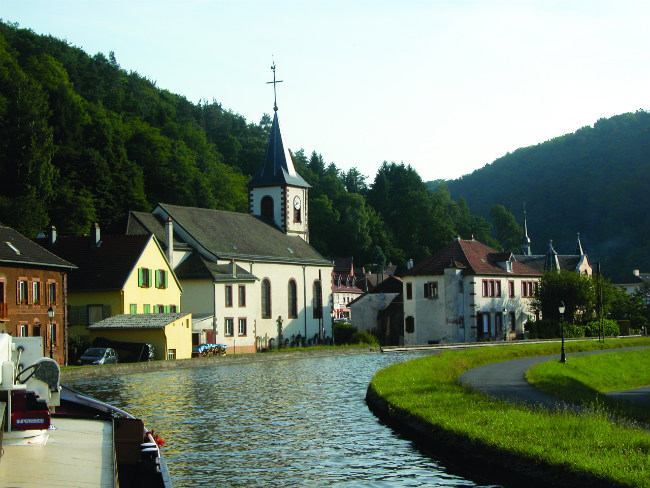
The picturesque village of Lutzelbourg, Lorraine. Credit: Tam and Di Murell
Dismissed as “ditch crawlers” by intrepid sailors, I, nevertheless, love the sedate way in which we negotiate the landscape. For us, this is a journey without a final destination; it is simply a journey way-marked by the people we meet and defined by the food and drink we discover en route. We see life, as it were, through the back door of whichever country we are in. How else could we engage in the companionable, albeit brief exchange of words, with that old fellow in his canal-side garden as he hoes between his rows of vegetables or with those guys paddling about in the muddy shallows collecting freshwater crayfish in a bucket as we go boating by?
We are the willing recipients of canal-side largesse: lock-keepers offer their garden produce, pointing me down the path to where the best of their beans, tomatoes or lettuces are to be found. From one we have bought jars of truffles personally collected from the forest close to his back door; apple eau-de-vie has come from another, made with his own apples and turned into a spirituous brew by the travelling distiller who stops by every year; and from others we have happily accepted gifts of over-sized courgettes, sacks of pears and plums and, once, three freshly laid goose eggs.
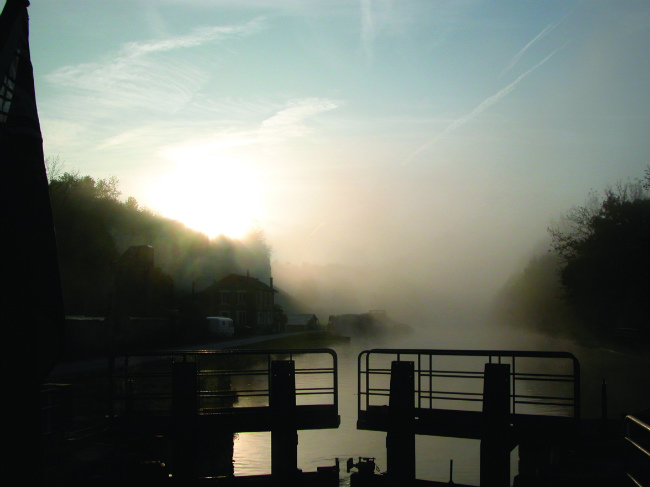
Misty morning on the water. Credit: Tam and Di Murrell.
To moor one night in the deep stillness of the countryside far from any dwelling, and the next under street lights in the centre of a bustling city offers contrasts not to be found in any other form of modern travel. Nor do we need to be searching always for somewhere new. We look forward to returning to familiar places, each with some special attribute of its own; it may be just the one thing they make really well, like the boudin blanc in Rethel on the Canal des Ardennes, the pâté en croûte from the bakers at Cumières on the River Marne, or the wine bought from Alphonse Mellot’s shop on the very top of the hill in Sancerre on the Canal du Centre. We know we can tie up on the doorstep of such places and will be welcome to stay as long as we like. On our travels we stop to visit farms, smallholdings, gardens and orchards; we shop for the region’s specialities at the markets, sample local dishes, visit the winemakers and check out the restaurants. We can buy our milk straight from the cow, cheese direct from the maker and foie gras from the lady who feeds the geese.
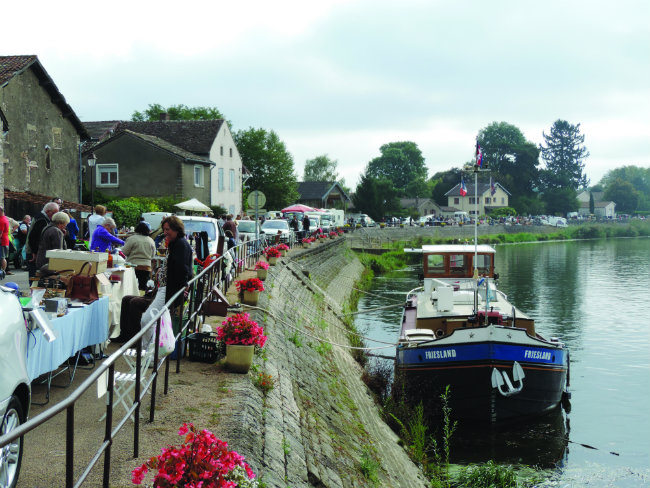
Stopping for market day at the village of La Truchère in Burgundy. Photo: Tam and Di Murrell
We Are At Home
We have the time to find out from the village butcher the best way to cook an unknown cut of meat, and from the charcutier how to serve an unfamiliar dish on display in his window. We do not come as visitors with barely time to settle before moving on, but as residents, albeit in transit. For the time being our address will be wherever we choose to stop, be it the village pontoon, some city centre quay, that deserted sand wharf on a river bank or canal-side grain silo on the outskirts of town. Wherever we are, we are at home.
It’s not all rusticity and bucolic living though. After all, canals were built as trade routes to serve the needs of agriculture and industry. We will find ourselves occasionally boating through the old industrial heartlands of France and Belgium. When these waterways are still serving the purpose for which they were originally built, we feel small and out-of-place as we pass beneath great cooling towers, staring wide-eyed up at the busy scrap and aggregates wharves, steelyards and smelting works.
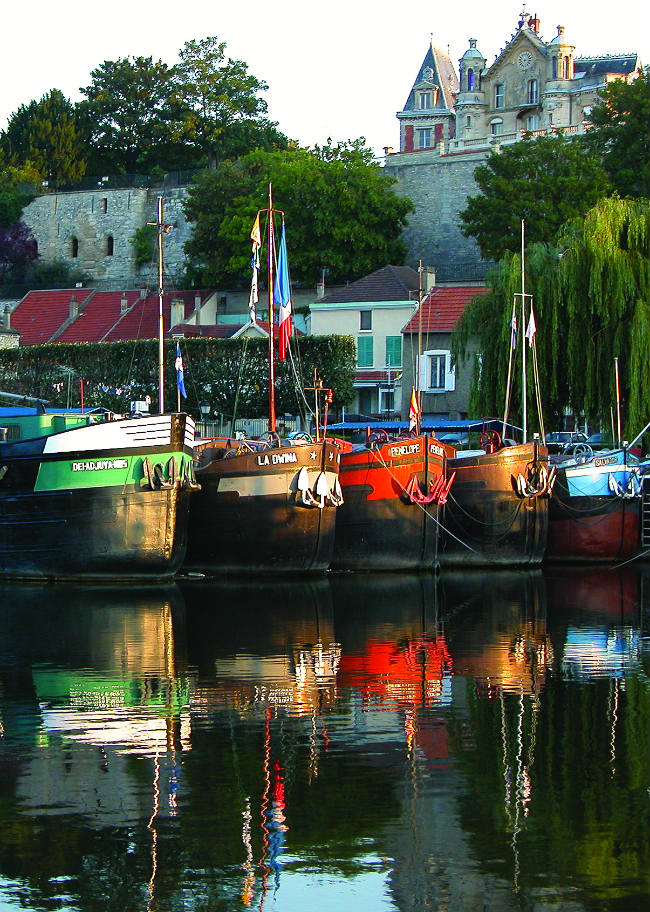
Photo: Tam and Di Murrell
‘Friesland’ – 24 metres long and just over 4 metres wide – is quite big for a private boat, yet here in this environment she is utterly dwarfed by the enormous barges which come from all over Europe to discharge their freight of pressed scrap cars and to load again with the finished steel coils destined for Rotterdam or Antwerp. Sand barges progress majestically along the waterway, maybe six or eight at a time, tied two abreast, propelled along by enormous pusher tugs with names like ‘Nemesis’ or ‘Titanic’; we, meanwhile, roll about in their wake as they pass close by.
Imperceptibly, the rainbow-laden, oily water in which our barge is floating thins and, as in a film, a slow fade moves us out of the greyness into sunlight and a more sympathetic land where quiet villages of fine stone houses, farm yards and barns dot the scene. Chickens scratch in the dust, cats laze in the sunshine and old men and their dogs drowse in the doorways of the lock cottages as we slip by. Mostly the old men stay put – they’ve seen it all before – but the dog will usually rouse himself and amble over, hoping some titbit will come his way. We rise in the lock; the dog peers down from above. Who can resist that hopeful look? By the time we are level I have a slice of sausage or biscuit ready. He takes the morsel offered, turns and ambles back to the doorway, content.
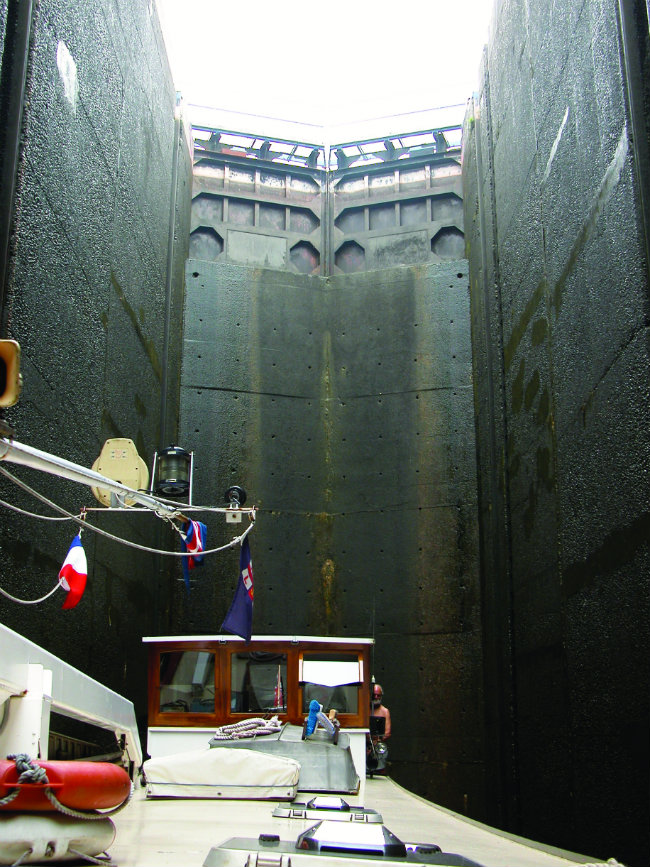
15 metres under the lock at Rechicourt-le-Chateau. Photo: Tam and Di Murrell
Vineyards sweep down the hillsides in impeccable rows like soldiers on parade. In such places our days pass slowly; we too bask in the sun then swing the boarding ladder over the side to swim in the clear water. On deck, in the cool of evening and over a glass of the local wine, we are entertained by the aerial dances of bats and swallows swooping low in search of their supper. Accompanying music is supplied courtesy of frogs and cicadas.
Eventually though, we are ready to depart, off in search of more intellectual pursuits. ‘Friesland’ edges into graffiti-covered suburbs and we begin to feel a little vulnerable. Here be people. Sometimes there is no choice but to continue on into the badlands where every group of young men hanging about close to a lock, lurking on the towpath or leaning over the parapets of the bridge through which we are passing is viewed with trepidation. Then before you know it, we have arrived, fetching up in attractive and surprisingly peaceful surroundings in the centre of a city, often a mere stone’s throw from some historic or architectural wonder. What visitor, other than he who arrives by water, can find himself congenially at home beneath the Eiffel Tower, beside the famous windmills of Bruges or in the middle of old Amsterdam?
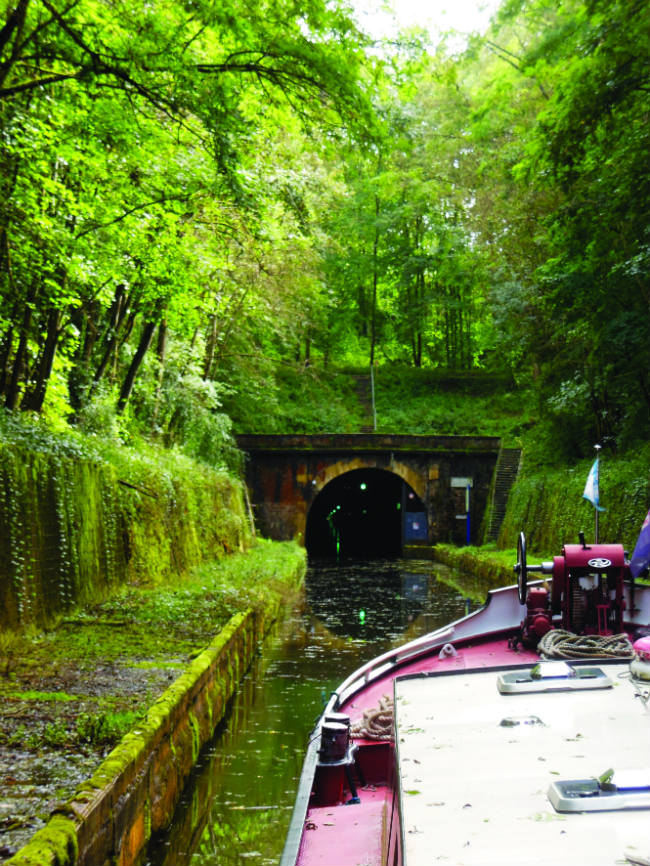
Approaching the 4,820m-long tunnel of Balesmes-sur-Marne.
photo: Tam and Di Murrell
A Different Perspective
We travel slowly, yes, but in the process discover more than any speeding motorist could ever hope to. We see places that no normal holiday-maker will ever visit and view them from an entirely different perspective. Imagine driving along the A26 autoroute, approaching the town of St Quentin, an hour or so from Calais; somewhere below is the Riqueval Tunnel, nearly six kilometres long: the brown signs tell you so. A small domestic scene, is at this moment, taking place beneath the very wheels of the vehicles on the road.
We have arrived in time for the afternoon tow. There is only one other boat waiting, the heavily laden ‘Tosca’ from Antwerp. Soon, the tug gives a hoot and our little convoy sets off on its slow beneath the Picardy hills. Madame ‘Tosca’, still in her pinny, steps down from her barge onto the tunnel towpath, hurries back through the darkness along the 40 or so metres which separates our craft and hands us up a plate upon which rests two squares of warm, just-baked, sponge cake full of juicy mirabelle plums. We thank her and scoff the lot. When we emerge from the tunnel they pull over and let us go by. I lean across to hand back their plate and wish them “bonne route”.
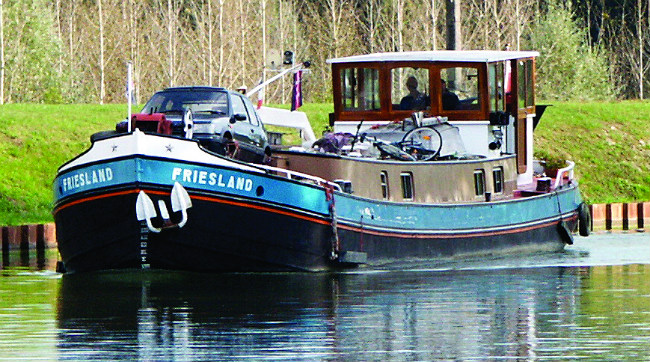
Photo: Tam and Di Murrell
Not for us then the tourist trails and high profile routes through the most popular parts. If we happen to find ourselves in such places it is by chance rather than intent. After all we can only go where the waterways we travel take us. Best of all when we do stop and tie up, local people do not view us with that suspicion reserved for unknown callers in out-of-the-way places. We are accepted simply as people who are passing through, on a boat. In fact, for the “ditch crawlers” that we are.
From France Today magazine
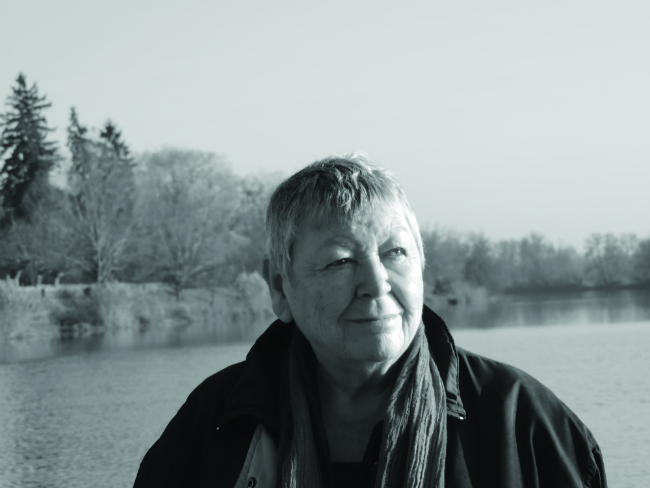
Di Murrell
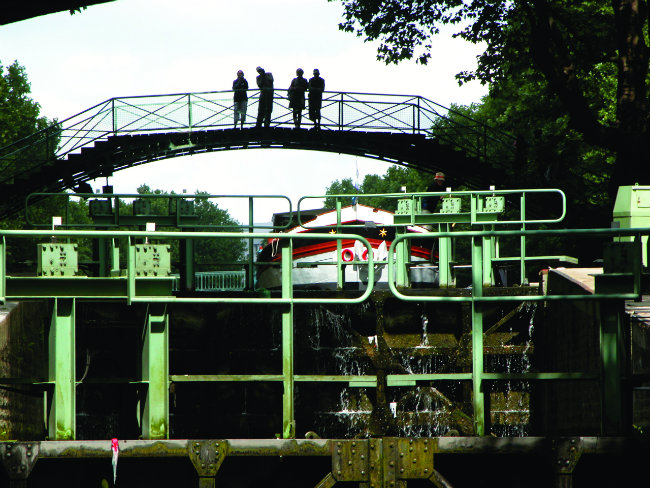
An unusual view of the Canal St Martin, Paris. Photo: Tam and Di Murrell
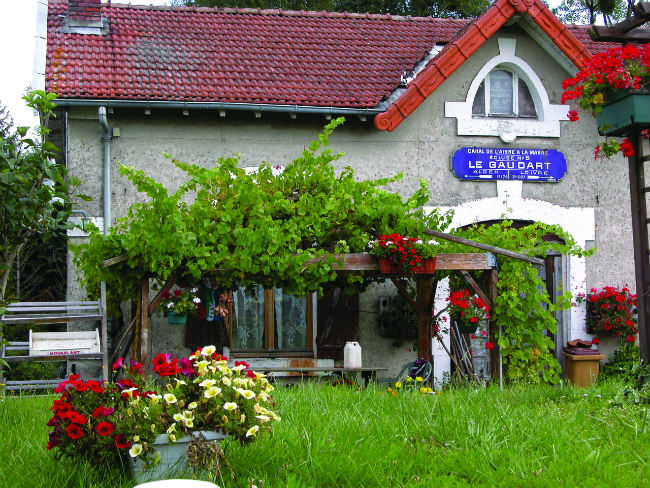
Photo: Tam and Di Murrell
Share to: Facebook Twitter LinkedIn Email
By Di Murrell
Leave a reply
Your email address will not be published. Required fields are marked *

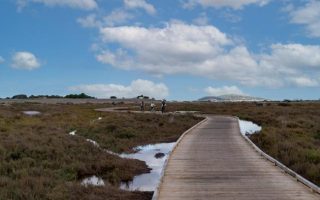
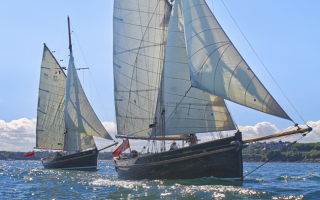
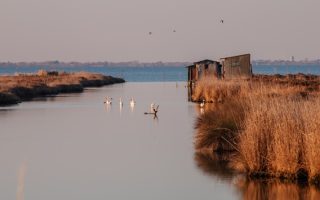
REPLY
REPLY
REPLY